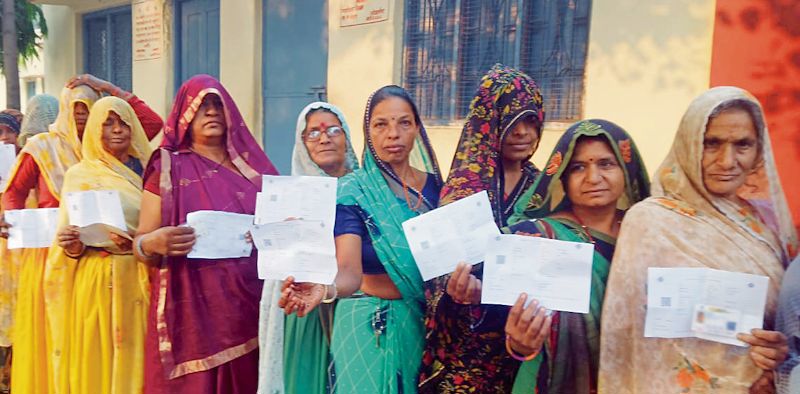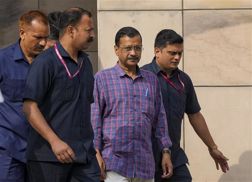
People’s power: The right to vote is basic, not only because the voter has the right to opt for a candidate or a political party, but also because voting enables him or her to transition from a subject to a citizen. ANI
Neera Chandhoke
Political Scientist
THERE was a time, not so long ago, when theorists of substantive democracy scoffed at the two presuppositions of minimalist theories of democracies. One, democracy is a method of choosing leaders who will rule the country for the next five years. Two, democracy is valuable because it enables a peaceful transfer of power from one set of political elites to another. For defenders of substantive democracy, this interpretation is simply unpersuasive. Democracy as a form of rule is valuable not only because it grants all eligible citizens the right to exercise their franchise, but also because it enables the realisation of the foundational principles of a good life: liberty, equality, distributive justice, political participation, the rule of law and the accountability of the elected. These are realisable because substantive democracies possess a vibrant civil society, an independent media and an impartial judiciary to defend the rights of citizens.
With the onslaught of ‘elected authoritarians’ — a phrase that is an oxymoron at best — most committed democrats have been compelled to put aside their dreams of substantive democracy and focus their attention on free and fair elections. Ahead of the General Election, it is worthwhile to recollect that the electoral process consists of three phases: the pre-election period, voting and the outcome. No one should be able to tamper with the result. This violates the basic right of individuals to choose their leaders, howsoever fractured the outcome of the election might be. We certainly have to ensure that the pre-election process is free and fair. Think of elections as a gigantic marketplace in which the voter has the choice to cast his vote in favour of candidate X, Y or Z. Freedom during the pre-election phase is an essential precondition for democracy because it prioritises choice.
A citizen can only choose if he has options. Without options, the right to choose is completely hollowed out, much like a shopping mall where only one brand is on offer. This is a violation of the basic right to franchise. The right to vote is a basic right, not only because the voter can opt for a candidate or a political party that will rule over him, but also because voting enables him to transition from a subject to a citizen. Members of a society in which one political party dominates like a veritable colossus over the others, either because it has got Opposition leaders imprisoned or has allegedly given directions to freeze an Opposition party’s bank accounts, are not citizens who have inviolable rights. They are subjects, much as Indians were subjects of the British Empire. Millions of Indians bravely fought for the independence of their country from British colonialism. What were they fighting for, if not democracy?
The shift from substantive democracy to minimal democracy, at least for the moment, is largely due to huge disappointment with the way political parties have misused this form of government. For democrats of this genre, democracy is a ‘hurrah’ word, simply because it helps realise many things that are of value: from warding off war to ensuring economic growth and wellbeing to making the world a better place to live in. The most persuasive argument for substantive democracy is the right to participate in processes of decision-making protected by a vibrant civil society and the media. This realises the political competence of every individual. Participative or deliberative democracy is a perfect form of modern democracy because it gives each citizen a voice and the right to be heard. Every citizen has the right to be treated with dignity, and the best way to ensure this is to protect a deliberative arena of equals, or at least an arena fired by enthusiasm for equality. A society of equals is a just society.
Today, priorities are bound to be different. We always knew that money power ruled. Now we know for certain that politics is bolstered by big businesses, as the data on electoral bonds reveals. Political parties and their agendas are up for sale to the highest bidder. Processes of decision-making are shrouded in secrecy. A section of the media has become servile; appalling poverty and unbelievably vulgar spectacles mounted by the affluent exist cheek by jowl. Social prejudice against minorities is fomented by cynical politicians to cause a divide in public opinion, and unthinkable discrimination continues to dog the disadvantaged.
Our faith in democracy has not been shaken, but our confidence in the party system that throws up politicians who are power-hungry and contemptuous of the fundamental rights granted by the Constitution has been eroded.
Indian citizens stand at a crossroads ahead of the Lok Sabha polls. We will vote, but in a society where the advantages of democracy, the rule of law, fundamental rights and an independent media have been steadily whittled away, we are left with only elections.
We have to choose wisely, not to facilitate power-hungry candidates to acquire power, but because we want more. We want the candidates we vote for to contribute to the making of the good society we yearn for.
Join Whatsapp Channel of The Tribune for latest updates.



























